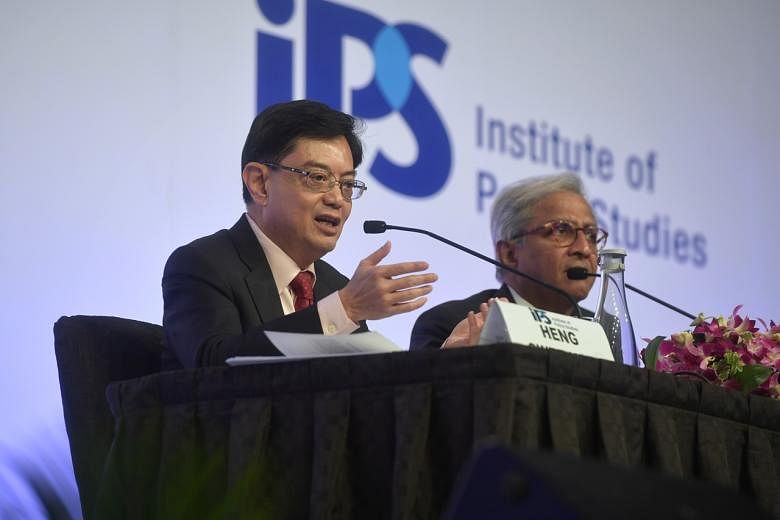Leaders and members of opposition parties questioned Deputy Prime Minister Heng Swee Keat about the goods and services tax (GST), immigration and the elected presidency yesterday at the annual Singapore Perspectives conference, giving a preview of the issues that might dominate at the next general election.
The exchanges followed a speech by Mr Heng in which he set out the fourth-generation political leadership's pledge to work with Singaporeans in shaping the country's future and making the partnership a cornerstone policy.
Singapore Democratic Party chairman Paul Tambyah, People's Power Party chief Goh Meng Seng and Progress Singapore Party (PSP) assistant secretary-general Leong Wai Mun were among opposition politicians invited to the conference by the Institute of Policy Studies (IPS).
IPS director Janadas Devan said in his opening remarks that Workers' Party chief Pritam Singh had declined an invitation to speak at the event.
Dr Tambyah fired the first question from the floor, questioning the Government's decision to raise GST, which he said is acknowledged universally as regressive. The tax is set to go up from 7 per cent to 9 per cent some time between 2021 and 2025.
But Mr Heng said Singapore's tax system as a whole is progressive, with more benefits going to the lower-income groups,
He cautioned against nitpicking on one or two aspects of it. Also, the GST is borne not just by Singaporeans, but also by anyone who consumes goods and services in Singapore, including tourists and expatriates who work here, he added.
He also said he had considered alternatives, but had less room to play with corporate and personal income taxes as people and companies could relocate easily.
Mr Goh questioned him next on the immigration policy, asking if society could become more divisive if the Government caved to the pressure of new citizens whose allegiances may not lie with Singapore.
Mr Heng said new citizens could indeed become a divisive force if people exploit the issue and "start casting doubts on the loyalty and fitness of new citizens".
He added that there was no reason to doubt their loyalty as they have become citizens by conviction, having chosen to come to Singapore to build a future.
Many are also married to Singaporeans, with one in three marriages here between a Singaporean and a national of another country.
Pointing to how some people have promulgated a narrative which pits born and bred Singaporeans against new citizens, Mr Heng said: "In that regard, I must say I am very troubled that so many people are seeking to exploit these differences instead of making the effort to integrate them."
He added that while the Government must do its best to take care of Singaporeans, taking a nativist approach is not the way and will cause Singapore to wither.
The issue of the elected presidency was raised by Mr Leong. The PSP's leader, Dr Tan Cheng Bock, became ineligible to run in the 2017 presidential election after the eligibility criteria were tightened.
Mr Leong, who said he was speaking in his personal capacity, argued that such strict criteria would limit the pool of possible candidates and curtail the institution's effectiveness as a check on the Government.
Replying, Mr Heng said the President continues to play a very important role as custodian of Singapore's reserves, citing, for instance, that the Budget cannot be introduced in Parliament until the President has been satisfied it will not draw on past reserves.


